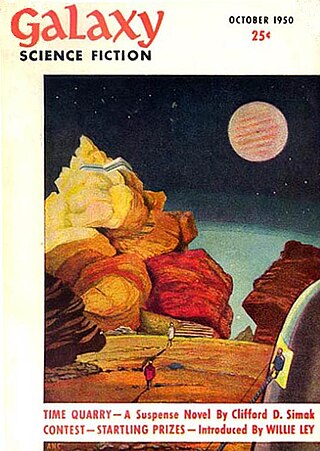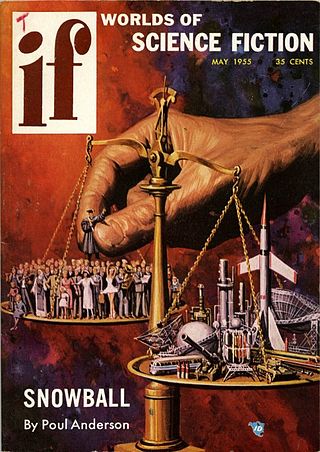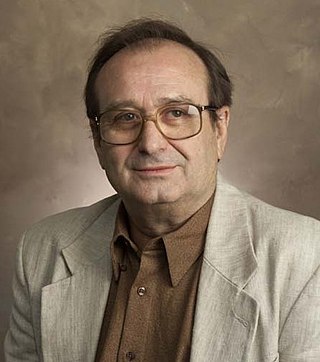Related Research Articles

Charles Sheffield, an English-born mathematician, physicist and science-fiction writer, served as a President of the Science Fiction and Fantasy Writers of America and of the American Astronautical Society.

Galaxy Science Fiction was an American digest-size science fiction magazine, published in Boston from 1950 to 1980. It was founded by a French-Italian company, World Editions, which was looking to break into the American market. World Editions hired as editor H. L. Gold, who rapidly made Galaxy the leading science fiction magazine of its time, focusing on stories about social issues rather than technology.

If was an American science fiction magazine launched in March 1952 by Quinn Publications, owned by James L. Quinn.
Andre Alice Norton was an American writer of science fiction and fantasy, who also wrote works of historical and contemporary fiction. She wrote primarily under the pen name Andre Norton, but also under Andrew North and Allen Weston. She was the first woman to be Gandalf Grand Master of Fantasy, to be SFWA Grand Master, and to be inducted by the Science Fiction and Fantasy Hall of Fame.

Eric Flint was an American author, editor, and e-publisher. The majority of his main works are alternate history science fiction, but he also wrote humorous fantasy adventures. His works have been listed on The New York Times, The Wall Street Journal, The Washington Post, and Locus magazine best seller lists. He was a co-founder and editor of the Baen Free Library.

The Magazine of Fantasy & Science Fiction is a U.S. fantasy and science-fiction magazine first published in 1949 by Mystery House, a subsidiary of Lawrence Spivak's Mercury Press. Editors Anthony Boucher and J. Francis McComas had approached Spivak in the mid-1940s about creating a fantasy companion to Spivak's existing mystery title, Ellery Queen's Mystery Magazine. The first issue was titled The Magazine of Fantasy, but the decision was quickly made to include science fiction as well as fantasy, and the title was changed correspondingly with the second issue. F&SF was quite different in presentation from the existing science-fiction magazines of the day, most of which were in pulp format: it had no interior illustrations, no letter column, and text in a single-column format, which in the opinion of science-fiction historian Mike Ashley "set F&SF apart, giving it the air and authority of a superior magazine".

Michael Diamond Resnick was an American science fiction writer and editor. He won five Hugo awards and a Nebula award, and was the guest of honor at Chicon 7. He was the executive editor of the defunct magazine Jim Baen's Universe, and the creator and editor of Galaxy's Edge magazine.

John Joseph Adams is an American science fiction and fantasy editor, critic, and publisher.

Sarah Bear Elizabeth Wishnevsky is an American author who works primarily in speculative fiction genres, writing under the name Elizabeth Bear. She won the 2005 John W. Campbell Award for Best New Writer, the 2008 Hugo Award for Best Short Story for "Tideline", and the 2009 Hugo Award for Best Novelette for "Shoggoths in Bloom". She is one of a small number of writers who have gone on to win multiple Hugo Awards for fiction after winning the John W. Campbell Award for Best New Writer.

Jim Baen's Universe (JBU) was a bimonthly online fantasy and science fiction magazine created by Jim Baen. It was recognized by the SFWA as a Qualifying Short Fiction Venue. JBU began soliciting materials in January 2006 and launched in June 2006. The magazine contained around 120,000 to 150,000 words per issue. It closed in 2010.
John C. "Bud" Sparhawk is an American science fiction writer. He writes humorous science fiction, in particular the Sam Boone series of short fiction.
Tony Daniel is an American science fiction writer and was an editor at Baen Books before becoming a senior editor at Regnery Publishing.
James Cambias is an American science fiction and fantasy writer and tabletop game designer.

Larry Correia is an American fantasy and science fiction writer, known for his Monster Hunter International, Grimnoir Chronicles, and Saga of the Forgotten Warrior series. He has authored or co-authored over 20 novels, has over 50 published short works, and has co-edited three published anthologies.

Nora Keita Jemisin is an American science fiction and fantasy writer. Her fiction includes a wide range of themes, notably cultural conflict and oppression. Her debut novel, The Hundred Thousand Kingdoms, and the subsequent books in her Inheritance Trilogy received critical acclaim. She has won several awards for her work, including the Locus Award. The three books of her Broken Earth series made her the first author to win the Hugo Award for Best Novel in three consecutive years, as well as the first to win for all three novels in a trilogy. She won a fourth Hugo Award, for Best Novelette, in 2020 for Emergency Skin. Jemisin was a recipient of the MacArthur Fellows Program Genius Grant in 2020.

Brad R. Torgersen is an American science fiction author whose short stories regularly appear in various anthologies and magazines, including Analog Science Fiction and Fact and Orson Scott Card's Intergalactic Medicine Show.
"The Fire When It Comes" is a fantasy short story by American writer Parke Godwin. It was first published in the January 1981 issue of The Magazine of Fantasy & Science Fiction.
"Time Deer" is a 1974 magic realism short story by Craig Strete. It was first published in Red Planet Earth, in June 1974, and subsequently republished in Worlds of If, in November 1974.
References
- 1 2 Arsen Darnay, at The Encyclopedia of Science Fiction ; published July 8, 2014; retrieved October 27, 2014
- 1 2 Gateways to Forever: The Story of the Science-Fiction Magazines, 1970-1980, by Mike Ashley; published January 1, 2007. by Liverpool University Press (via Google Books)
- 1 2 Arsen Darnay at the Science Fiction Awards Database; published August 10, 2012; retrieved October 27, 2014
- ↑ KARMA, at Kirkus Reviews , originally published October 30, 1978; retrieved October 27, 2014